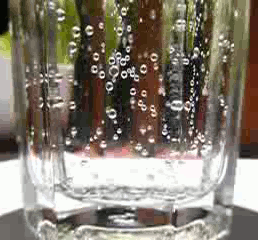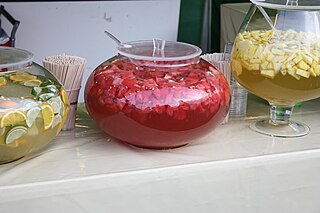
A spritzer is a tall, chilled drink, usually made with white wine and carbonated water or sparkling mineral water. Fermented simple syrup can be used instead of white wine to keep it sweet but flavor neutral.

Carbonated water is water containing dissolved carbon dioxide gas, either artificially injected under pressure or occurring due to natural geological processes. Carbonation causes small bubbles to form, giving the water an effervescent quality. Common forms include sparkling natural mineral water, club soda, and commercially produced sparkling water.
"Half and half" is the name of various beverages and foods made of an equal-parts mixture of two substances, including dairy products, alcoholic beverages, and soft drinks.

Lemonade is a sweetened lemon-flavored drink.

The term punch refers to a wide assortment of drinks, both non-alcoholic and alcoholic, generally containing fruits or fruit juice. The drink was introduced from the Indian subcontinent to England by employees of the East India Company in the late 17th century. Punch is usually served at parties in large, wide bowls, known as punch bowls.

Minute Maid is a product line of beverages, usually associated with lemonade or orange juice, but which now extends to soft drinks of different kinds, including Hi-C. Minute Maid is sold under the Cappy brand in Central Europe and under the brand "Моя Семья" in Russia and the Commonwealth of Independent States. Minute Maid was the first company to market frozen orange juice concentrate, allowing it to be distributed throughout the United States and served year-round. The Minute Maid Company is owned by The Coca-Cola Company, the world's largest marketer of fruit juices and drinks. The firm opened its headquarters in Sugar Land Town Square in Sugar Land, Texas, United States, on February 16, 2009; previously it was headquartered in the 2000 St. James Place building in Houston.

Lift is a range of soft drinks produced by The Coca-Cola Company that has been available in Australia, New Zealand, Latin America, Germany, Austria, Philippines and Eastern Europe since the 1970s, which is carbonated and flavored with fruit juice. In Australia and New Zealand, a standard bottle of Lift is lemon flavoured, whereas in Germany and other markets the default flavour is Apple.

A sour is a traditional family of mixed drinks. Sours belong to one of the old families of original cocktails and are described by Jerry Thomas in his 1862 book How to Mix Drinks.

Apfelschorle, also Apfelsaftschorle or Apfelsaft gespritzt in German, is a popular soft drink in Switzerland, Germany, and Austria. It consists of carbonated mineral water and apple juice. The broader category Fruchtschorle consists of any fruit juice mixed with carbonated water, but Apfelschorle is by far the most common. Spritzer is called Weinschorle.
Parle Agro Private Limited is an Indian company that owns Frooti, Appy, LMN, Hippo and Bailley brands.
Drink mixers are the non-alcoholic ingredients in mixed drinks and cocktails. Mixers dilute the drink, lowering the alcohol by volume in the drink. They change, enhance, or add new flavors to a drink. They may make the drink sweeter, more sour, or more savory. Some mixers change the texture or consistency of the drink, making it thicker or more watery. Drink mixers may also be used strictly for decorative purposes by changing the color or appearance of the drink. They also simply increase the volume of a drink, to make it last longer.

The Pimm's cup is a cocktail that is popular in England, in the United Kingdom. It is one of numerous fruit cups, a type of cocktail with gin, a soft drink, and fruit. Its primary spirit is Pimm's No. 1 Cup, a gin-based beverage flavored with fruits and spices invented around 1823 as a health drink.

A "fizz" is a mixed drink variation on the older sours family of cocktail. Its defining features are an acidic juice and carbonated water. It typically includes gin or rum as its alcoholic ingredient.
Solo Beverage Company, also known as Joseph Charles Bottling Works and Investments Ltd., is a soft drink manufacturer in Trinidad and Tobago.

Cider is an alcoholic beverage made from the fermented juice of apples. Cider is widely available in the United Kingdom and the Republic of Ireland. The UK has the world's highest per capita consumption, as well as the largest cider-producing companies. Ciders from the South West of England are generally higher in alcoholic content. Cider is also popular in many Commonwealth countries, such as India, South Africa, Canada, Australia, and New Zealand. As well as the UK and its former colonies, cider is popular in Portugal, France, Friuli, and northern Spain. Germany also has its own types of cider with Rhineland-Palatinate and Hesse producing a particularly tart version known as Apfelwein. In the U.S. and Canada, varieties of alcoholic cider are often called hard cider to distinguish it from non-alcoholic apple cider or "sweet cider", also made from apples. In Canada, cider cannot contain less than 2.5% or over 13% absolute alcohol by volume.











